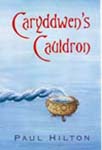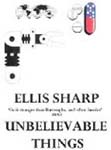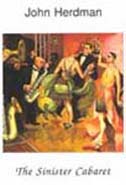Paul Hilton
Well Pressed
It would be interesting – and someone has no doubt done it – to conduct a survey on how many of the great seminal works of modern literature have been first published by small presses, or at any rate by publishers well outside the commercial mainstream.
The career of James Joyce would provide an obvious starting-point. In Scotland, where all publishers in recent times have been almost by definition small, there is perhaps a greater acceptance than in some national cultures, that work coming from such outlets is not necessarily to be shrugged off as simply having failed to make it in the big, cut-throat literary world where the real players operate; though there are vociferous persons around who clearly see it that way.
There is no doubt that the opportunities are dangerously in decline for serious fiction which is either experimental or deviates in other ways from the banal naturalism which (it is depressing to remind oneself) remains, even after all the great innovative movements of twentieth century literature, inertly dominant in contemporary British fiction. There is a lot of evidence that in the accountant-determined climate spawned by the huge publishing conglomerates many outstanding works are not getting into print at all, while the authors of others are turning to the lifeline offered by courageous and dedicated small presses operating under great financial constraints.
Such thoughts are prompted by my having read, in the past few weeks, a couple of extraordinary novels issued by two small presses with which I currently have dealings. Without these links I would almost certainly never have heard of either, far less read them. Yet both are remarkable and innovative books which deserve to be widely known. Though very different, they have a number of things in common. Both are big, ambitious works which take proper account of the pioneering work of twentieth-century fiction and seek to move the novel forward. Both are satirical, parodic and very funny, while possessed of a passionate and fundamental seriousness. One is certainly and the other probably pseudonymous, pseudonymity being in itself an interesting counter in the new author-reader relationships being explored. Both are alienated from, and explicitly critical of, contemporary consumerist society, though the perspective of one could be called holistic-ecological, while the other’s is clearly Marxist. And by a curious coincidence both – while ranging far afield imaginatively and geographically – circle around the same small corner of southern England.
 Caryddwen’s Cauldron is a first novel by Paul Hilton – a somewhat bland pseudonym for the author of a far from bland book. Seeming to owe more to the school of magic realism than to any other literary genre, it is a novel of quest and restoration which brings the world of Celtic mythology into hilarious and spectacular interaction with the corrupt present of business tycoons, international power politics, media manipulation, muddle-headed idealism, tortuous bureaucracy and decadent language. Five daughters from ‘the oldest family in Britain’ are engaged, along with a number of their male friends, in a search for the missing sixth. This is in essence the same search as for the missing piece of the legendary receptacle of the book’s title, for the absence of which all things are falling apart. They are helped by one Finbar direach, a survivor of the Tuatha de Danaan, in their struggle against the forces of evil personified by the leisure industry tycoon Myles Overton, behind whom lurks the demonic figure of the sinister Leatherwing. In the ‘tongue-only-half-in-cheek’ tone which Paul Hilton hits perfectly, we are warned that the ‘great conflicts between Gothic and Celtic, linear and cyclic, theist and animist, moderniser and traditionalist, are still being fought. That the battlefield is the human heart, and the greatest heroes may not even be aware they are fighting.’
Caryddwen’s Cauldron is a first novel by Paul Hilton – a somewhat bland pseudonym for the author of a far from bland book. Seeming to owe more to the school of magic realism than to any other literary genre, it is a novel of quest and restoration which brings the world of Celtic mythology into hilarious and spectacular interaction with the corrupt present of business tycoons, international power politics, media manipulation, muddle-headed idealism, tortuous bureaucracy and decadent language. Five daughters from ‘the oldest family in Britain’ are engaged, along with a number of their male friends, in a search for the missing sixth. This is in essence the same search as for the missing piece of the legendary receptacle of the book’s title, for the absence of which all things are falling apart. They are helped by one Finbar direach, a survivor of the Tuatha de Danaan, in their struggle against the forces of evil personified by the leisure industry tycoon Myles Overton, behind whom lurks the demonic figure of the sinister Leatherwing. In the ‘tongue-only-half-in-cheek’ tone which Paul Hilton hits perfectly, we are warned that the ‘great conflicts between Gothic and Celtic, linear and cyclic, theist and animist, moderniser and traditionalist, are still being fought. That the battlefield is the human heart, and the greatest heroes may not even be aware they are fighting.’
This is a tone of voice which manages to take nothing seriously and to take everything seriously. Parodies of Celtic heroic and mythological texts of which Flann O’Brien would be proud, and manipulations of their repetitive structures, point up mordantly the vapidity of contemporary speech. Hilton grabs hold of every fashionable cliché going and shakes it by the scruff of the neck. The satire of business and marketing lingos is relentless and savage. While the characters are, by design, cardboard cutouts and their talk ludicrously empty, offhanded observations of remarkable psychological acuity are scattered liberally throughout the text in such a way as to broach serious issues with a deft lightness of touch.
The narrative, which is racy and attractive and possessed of the best of the old-fashioned story-telling virtues, ranges from the Sussex Downs to the Corryvreckan whirlpool, from the London sewer system to the Aral Sea. But it is less its geographical than its mental and imaginative agility which gives this novel its power. Its freedom from the conventions of linear, naturalistic narration gives a wide-ranging and erudite mind the scope to do all kinds of unexpected things, which delight the sympathetic reader.
The last sentence can be applied equally well to Ellis Sharp’s Unbelievable Things. Sharp is the author of several books of quirky, off-centre stories and of a remarkable novella called The Dump  which, taken on its own, would classify him as a kind of socialist Beckett. If magic realism is the genre to which Hilton most closely approximates, Sharp’s novel is a self-declared post modernist metafiction. Now while much of the critical theory which is supposed to underpin post-modernism seems to me vacuous and pretentious, its practice in the hands of a skilful practitioner is the most liberating of experiences. Being allowed to contribute to the novel by, say, choosing a piece of furniture, does nothing to empower the reader, and tells him nothing except that the novel is an artistic and social construct, which any literate person always knew anyway. On the contrary, and pace Barthes, it is precisely the author whose power is enhanced by the techniques of auto-deconstruction, to the benefit and delight of the reader, by providing new and richer opportunities for freedom, inventiveness, and creative ‘play’. Two cheers for democracy!
which, taken on its own, would classify him as a kind of socialist Beckett. If magic realism is the genre to which Hilton most closely approximates, Sharp’s novel is a self-declared post modernist metafiction. Now while much of the critical theory which is supposed to underpin post-modernism seems to me vacuous and pretentious, its practice in the hands of a skilful practitioner is the most liberating of experiences. Being allowed to contribute to the novel by, say, choosing a piece of furniture, does nothing to empower the reader, and tells him nothing except that the novel is an artistic and social construct, which any literate person always knew anyway. On the contrary, and pace Barthes, it is precisely the author whose power is enhanced by the techniques of auto-deconstruction, to the benefit and delight of the reader, by providing new and richer opportunities for freedom, inventiveness, and creative ‘play’. Two cheers for democracy!
To read Sharp is to be reminded of how unusual an experience it is to encounter an author who has thoroughly absorbed the achievements of modernism, before taking these further steps. He himself defines his objectives more tellingly than any theorist could do. The writer talks of ‘scalding realism’s synthetic skin, breaking down its bogus brickwork, leaving a smear of ashes, a faint ticking and the hiss of punctured characters, of smouldering crumbling narrative wreckage a hundred years old.’ He yearns ‘for a jetsam litterage of convolvuli, of times lost or strayed, of lands derelict… while not wishing to dump coherence or too much pun-ish the unimaginable reader.’
So it is that, just as bourgeois society falls apart as the First World War overtakes it, the characters of the novel’s naturalistic first draft are overwhelmed by the catastrophes of post-modernism, finding themselves helplessly adrift ‘in a story where the physics was up for grabs, where history turned on a kopek, where unbelievable things might occur.’ Their names change and revert constantly as they wander from draft to draft, the author shamelessly intrudes upon their lives and interrupts their joys and tragedies by making cups of coffee and changing the background music, the solidity of their and every other world shimmers and dissolves, fleetingly reassembles itself and then metamorphoses into something other. Cinematic techniques are constantly evoked, and exploited to striking effect.
Yet Unbelievable Things is not an anarchic book. A coherent narrative thread is determinedly pursued through all the serpentine windings and the brilliant, richly comic digressions. Briefly, a doctor in a mental hospital discovers the manuscript of a shell-shocked patient who narrates how he fell in love with one of two sisters in a country house before the Great War. This character goes off to the war and the woman he loves marries someone else. The other sister, in the wake of an unexplained disaster, goes off to Russia where she is caught up in the revolution and eventually perishes in a prison camp. In the final section the hitherto unexplained disaster is described with extraordinary power:on the day of the elder sister’s wedding, the house and almost all the guests are destroyed by a massive landslip, as irreclaimably as the old Russia is about to be swept away by the Revolution.
Sharp’s writing in this narrative tour-de-force is astonishingly various in manner and technique. Firmly in the cloacal tradition of Swift, Joyce and Beckett, he is a supreme master of comic disgust. Yet he is also deeply serious and can write descriptive prose of astonishing passion and power, as in the cold anger of a sequence of horrifyingly convincing passages evoking the experience of soldiers in the trenches. Even more impressively, he can bring these two veins together, as in the macabre gallows humour of the tale of the three trench rats, Doug, John and Ramsay.
It is impossible to convey in a few words the complexity, variety and inventiveness of these two novels, which draw so richly upon the fluidity and associative power of the human mind itself. It would be shameful if they were denied the media coverage which the productions of big commercial publishers command as by right.



John Herdman is the author of Ghostwriting, Imelda and The Sinister Cabaret, all published by Black Ace Books.
Carydwwen’s Cauldron, by Paul Hilton, Black Ace Books (HBK £17.95, ISBN 1872988474)
Unbelievable Things, by Ellis Sharp, Zoilus Press (PBK £9.99, ISBN 1902878310)
Copyright John Herdman 2005.

Comments